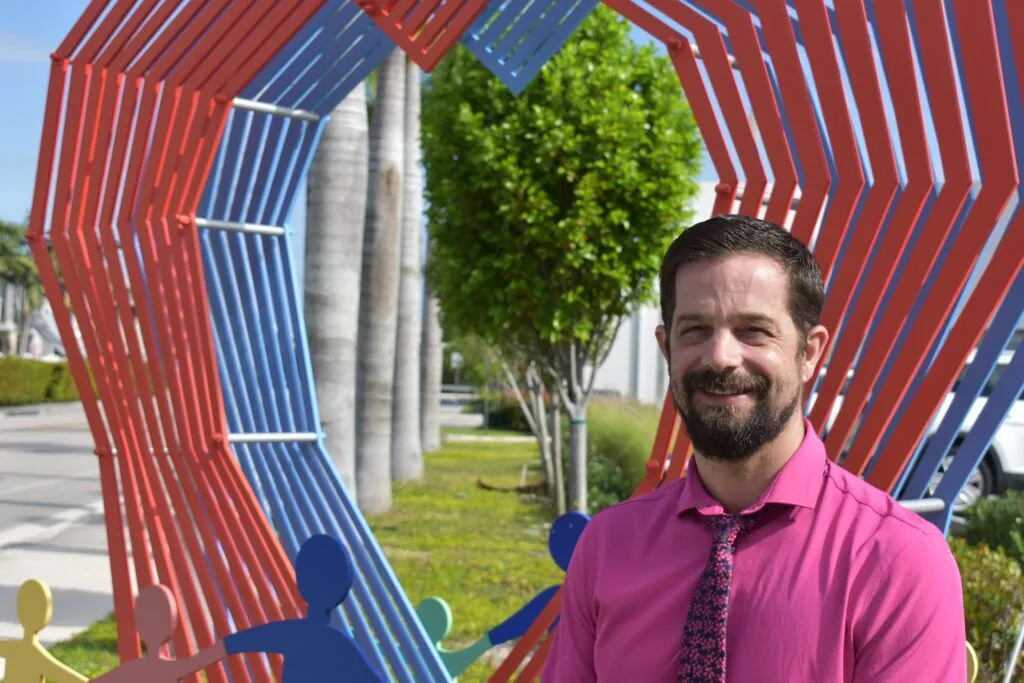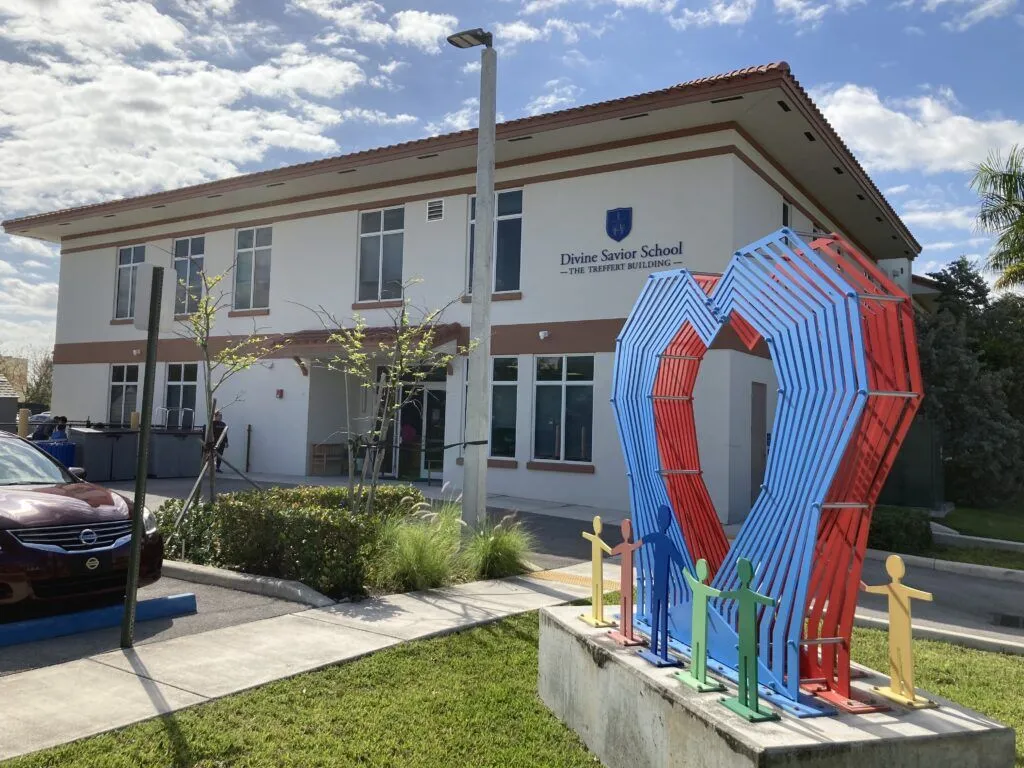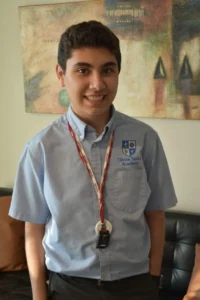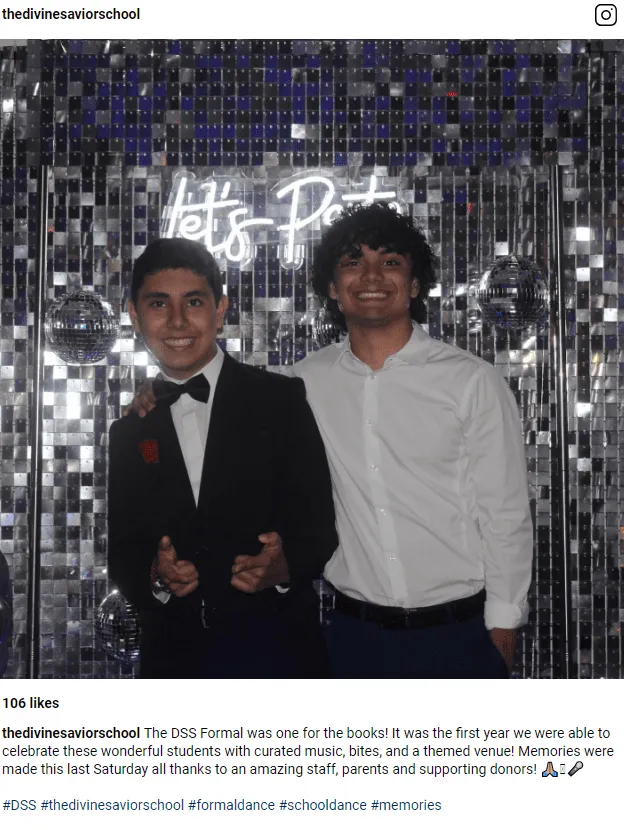
DORAL, Fla. – This was supposed to be Elise’s school, the white two-story building with beige trim that sits on a quiet street and serves students with moderate to severe development and behavioral needs.
When John and Jamie Althoff learned Elise, their unborn daughter, had Down syndrome, they wondered what education options existed near their South Florida home. John did the leg work, visiting nearly 30 schools for students with special needs. He didn’t feel that he found a good match for his daughter or his family.
A teacher at Divine Savior Academy (DSA) in Doral at the time, John asked the administration if he could start a program for students with special needs. They said yes, and five years later, in 2020, Divine Savior School (DSS) opened its doors to six students. By the end of the school year, enrollment had doubled.
Sadly, Elise was not one of them. She passed away a week before her due date. Tragic as that was, John pressed on with his vision for DSS.
“When we lost her, well, it didn’t stop the fact that there’s this need for a school like this,” John said.
Enrollment is expected to reach 55 during the 2024-25 school year.
“So,” John said, “there’s obviously a need.”
All DSS students attend the school with the help of a Family Empowerment Scholarship for Students with Unique Abilities, managed by Step Up For Students.
They receive Applied Behavioral Analysis (ABA) and speech and occupational therapy on-site. Each student has an individualized education program developed with input from the parents, therapist, and academic personnel.
There is a Bridge program for students in middle school and high school students who benefit from individualized academic attention and inclusion in a typical school setting.

Those students make the short walk across the parking lot to DSA and join those students for homeroom, two elective classes, and lunch.
There is a plan to begin a vocational program for graduates where they can transition into employment.
Some DSS students play on the basketball team that competes in the Special Olympics. John said they are hoping to start a similar program for flag football.
***
Jose Pablo Saenz finished his lunch in the DSA cafeteria, surrounded by students from both schools. Some days he ate with his older brother, Alvaro, who recently graduated from DSA. It’s this kind of inclusion that Jose Pablo’s parents – Ivan and Maria – find so important.
Jose Pablo was 8 when he developed a form of epilepsy that cannot be controlled by medication. Suffering from as many as nine seizures a day, he was diagnosed as hospital-homebound. Homeschooling, however, was not a good fit.

“He needed to be around other kids,” Maria said.
“We could see he was getting very depressed, very antisocial, and I was always concerned,” said Jose Pablo’s sister, Sofia.
Jose Pablo can go a few days without a seizure, but when they come, they are massive according to his dad.
“It creates like a concussion, and when you’re continuously exposed to those situations, it creates a lot of problems with short-term memory and the ability to learn,” Ivan said.
Jose Pablo was one of the original six to attend DSS when the doors first opened. Thanks to the Family Empowerment Scholarship for Students with Unique Abilities, he was able to find the right educational setting.
“The scholarship is a blessing,” Ivan said. “We found the place where he’s been able to thrive. Given his limitations, he’s still been able to go to school and learn how to read and write, learn some history, interact with children, develop his social skills.”
And with all the therapists on-site, Maria no longer has to drive Jose Pablo around South Florida from therapist to therapist.
DSS also provides a service for the parents where the fathers can meet as a group and the mothers can meet as a group and talk about being the parents of a special-needs child.
“When you have a child with special needs, it changes things,” Ivan said. “Your friends and sometimes members of your family pull back.”
“People can be cruel,” Maria said. “They ask, “Is he contagious? Is he possessed?’ ”
The groups meet to compare notes, vent, rant, and offer support.

“People don’t understand what it’s like to have a child with special needs,” Ivan said. “Intentionally or unintentionally, their ignorance can be very cruel to our children, to ourselves as parents, as well. So, it kind of drives us to be isolated. But within DSS we’ve been able to find this amazing environment where our children thrive, and where we as parents can openly express what the challenges are. It’s so gratifying to find a place like DSS, and without the help of the scholarship, we would have never been able to send Jose Pablo there.”
As the oldest of three, Sofia, who also graduated from DSA, has always looked out for Jose Pablo.
“I’m eternally grateful for DSS and what they’ve done for my brother and my family, as well,” she said.
***
From his office window, John Althoff, now the DSS school director, sees an SUV pull up to the front door of the school.
“Dillon’s here,” he called to the staff outside his office as he popped from behind his desk to greet Dillon and his mom. All students are met this way in the morning. The staff asks the parents about their child.
Did he have a good night’s sleep?
Did he eat breakfast?
Is there anything we should be on the lookout for?
This way they can anticipate what kind of behavior to expect that day.
“Have a good day, Dillon,” John said as he helped Dillon with his backpack and through the front door.
John, who already had a doctorate in education from Florida International University, earned a graduate certificate in Special Education from the University of Central Florida
It’s no surprise that John was able to start DSS. A former Marine, he was building his first house from scratch when he met Jamie. He also helped opened DSA’s middle school and later the high school.
“The FES-UA scholarship provides opportunity for our students with profound needs to access a program that might not otherwise be available to them,” Althoff said. “Divine Savior School provides a purposeful micro-school setting where each student is able to receive individualized support and therapy services to provide for their overall growth and development, as well as plan for positive inclusion opportunities with our sister school, Divine Savior Academy.”
He was asked if he ever takes a moment during the school day to appreciate the two-story school building, what it accomplishes each day, and what it stands for — a tribute to Elsie.
“All the time,” he said. “It’s been an interesting journey.”
The student capacity is nearly maxed out. So, what’s next?
Build another school.
“That’s what we’re working on,” he said. “Everything has its time, right?”


